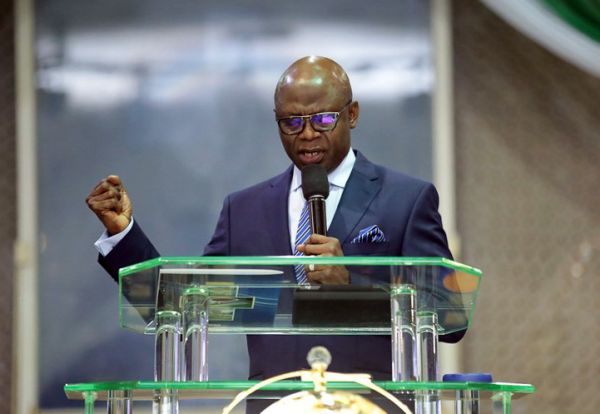President Muhammadu Buhari’s handling of the nation’s insecurity came under severe criticism yesterday. A former vice presidential candidate and Serving Overseer of the Latter Rain Assembly Tunde Bakare said the crime situation in Nigeria was a massive indictment of the capability and credibility of the security agencies under Buhari.
In his state of the nation broadcast entitled “Resetting Nigeria on the path of predictable progress” delivered at the church headquarters in Lagos yesterday, Bakare said a shake-up in the security sector was non-negotiable. “Buhari must be willing to do the needful, and not make just cosmetic changes, to stop the haemorrhage.”
The one-time running mate to President Buhari under the defunct Congress for Progressive Change (CPC) in the 2011 presidential election identified seven categories of security threats in the country: politically motivated threats; economically motivated threats; ideologically motivated threats (an example being Boko Haram insurgency); and ethnic nationalistic threats, which he blamed on the failure to unite Nigeria as one nation. He warned that the different ethnic groups threatening to go their separate ways were fraying the fabric of the nation.
The cleric also listed what he described as zonal security threats and state-engineered security threats. He said that the Nigerian state had been a threat to its own national security. “This might sound strange but it is real.” Lastly is the strategic threat, which he blamed on foreign interests and actors.
Bakare suggested that the government and critical stakeholders should rethink the national security philosophy as the first step towards addressing the challenge.
“The first step towards securing our nation is revisiting the philosophical foundations of governance. This calls for prioritising the security of the governed above that of the government. It requires making a transition from the governance philosophy of Louis XVI to that of David, king of Israel, as captured in the Bible.”
“The need to return to true federalism through devolution of powers cannot be overemphasised. Subnational governments must be empowered to provide security alongside federal structures. The true test of leadership in a federal system is the willingness of the central government to empower the federating units. It must be a case of first among equals. The Federal Government must, therefore, stop being afraid of empowered states and local governments. We must embrace multilevel policing in the spirit of true federalism, setting in place appropriate constitutional checks and balances to prevent abuse. Not to act swiftly, or to do otherwise, can only be counterproductive to our stability and progress.”
The cleric also canvassed recreation of the nation’s security culture. “Eternal vigilance is the price of liberty. We can begin to redesign our security architecture by taking a number of first steps. The funds being funneled into extra universities should be channeled towards building the capacity of the Nigerian Defence Academy (NDA) and prosecuting the war against Boko Haram. We must then refocus the training of our soldiers to cater to unconventional warfare. However, to create lasting change, we must institutionalise security interventions rather than respond with a fire brigade approach to emerging challenges.”
Source: Guardian Newspaper.




